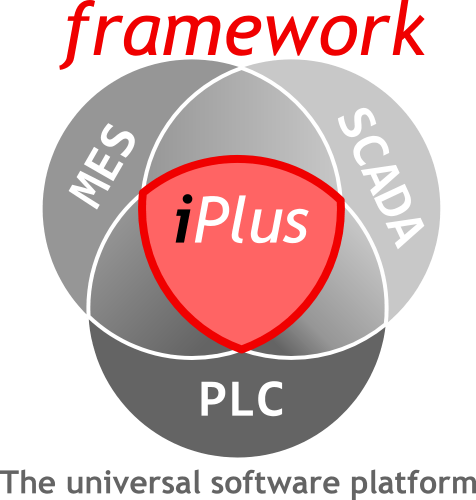
What is iplus-MES?
# Which features does a MES (Manufacturing Execution System) system need today in order to meet the challenges of the competition in modern industry?
- An optimum stability, performance and flexibility must be ensured.
- Complex production processes have to be presented in a way that is easy to understand for the user.
These requirements are the basis in the development of iplus-MES. With iplus-MES you completely close the gap between the company level (ERP) and the field level at the highest technological level.
# iplus-MES is a product that was developed with the iplus-framework. This is a standard software that is highly configurable and adaptable due to the advantages that the iplus-framework brings with it. That is why it can be expanded to different sectors and customer-specific solutions. We have already covered a large part of the requirements from process technology with our own industry add-ons.
# If you are an end customer,
you can purchase it directly from us and we help you to introduce the software. We can also implement your individual wishes, which are not included in the standard, as a customer add-on.
# If you are an engineering company or an integrator,
you can roll it out with your own customers. Due to the object and service-oriented architecture of the iplus-framework, you can expand and adapt everything in the MES modules for your industries.
Here: Download MES brochure!
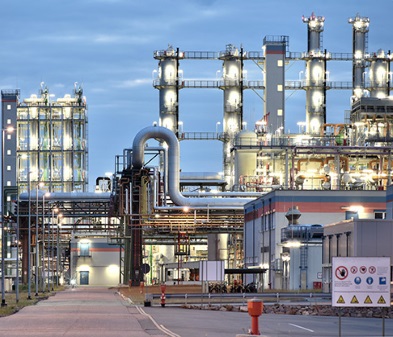 |
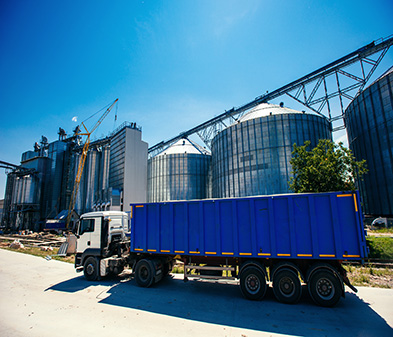 |
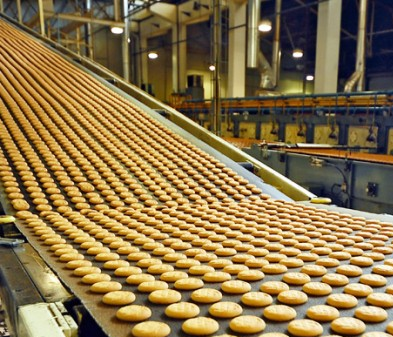 |
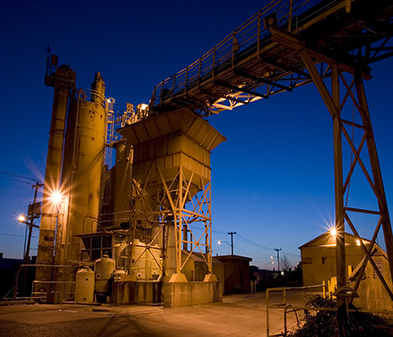 |
Architecture
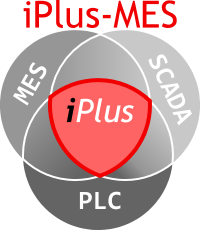
# The database model serves as the base on which various production and business processes can be depicted. We put great emphasis on creating a completely normalized model that adapts to your production and IT system landscape, not the other way round. The ease of adaption can only take effect if you’re using the right “chassis” such as our iplus-framework.
# As an integrator, you can also expand the database model for your purposes or you can use your own model that reuses parts from our MES model. This freedom is possible because you decide for yourself on which software levels you want to set on:
- iplus-framework.
- iplus-MES, which builds on level 1.
- Your specially developed industry solution, which is either built on level 2 or directly on level 1.
- Your customer solution that builds on level 3.
Why iplus-MES?
# iplus-MES is not dedicated to specific industries but can be used in both process and production technology. The special structure of our iplus-framework allows for customized extension of the MES features by sectoral features. This way, iplus-MES has come to be in use in various industries.
# With its failure-free merging of production cycles, iplus-MES helps you stay one step ahead of the competition and achieve a perfect utilization of resources and the highest possible efficiency. In addition, all processes are rendered considerably more transparent.
Read at Wikipedia, which benefits you have with a MES and why you should consider to introduce it in your factory: https://en.wikipedia.org/wiki/Manufacturing_execution_system
# Facts and Figures:
- >30 Installations, >500 Workplaces/Users, >4000 Machines and Devices
- 100% successful projects,
- 100% satisfied customers (Ask us for our references),
- Best price/performance ratio of any competitor and best ROI. (Ask for a non-binding offer),
- Investment security through on-premise license model. (Due to the cloud hype in recent years, the TCO has increased enormously. Cloud and Industry 4.0 are two completely different things.)
# “With iplus-MES you make the right business decision in the long term!”
Usability perfected
# The real usability of a software depends on its user acceptance, we are aware of that fact. For that reason, we developed iplus-MES with a focus on high usability. Many years’ experience and constant communication with our users has helped us succeed in creating with iplus-MES an easy and intuitive graphical user interface that differs vastly from other products on the market.
# The merging of the world of SCADA with the transaction-based world of MES allows for an exceptional user experience:
# The user can “surf” and navigate seamlessly, without key-board entry, between physical objects, such as machines and modules, and business objects like application data since all features are linked. With the help of iplus-MES the user does not have to know all relations and contiguities between data in order to be able to manage the control system effectively. That shortens training periods considerably.
Scope of iplus-MES:
- # master data management
- # production and control
- # material management
- # logistics
- # quality management
- # maintenance
Masterdata
# The master data management comes with a basic set of properties that are commonly used in a lot of industries. Through the iplus-framework, the database model (entity framework) can be extended to include more project- or industry specific properties, relationships and complex structures without losing updatability! Some of the most important master data are:
- # material master (groups, GMP, type of material)
- # quantity units and conversion rules
- # hierarchical model of storage location and stockyard
- # lab and quality master data
- # client and address management
- # staff and visitor administration
- # vehicle and motor pool master data
- # RFID/Smart Card management
- # service and maintenance data
- # workflow management
- # Bill of materials / formulas
# The variety of the aforementioned master data illustrates how wideranging iplus-MES is. Its one specific feature, however, is its production technology. Through a ingeniously method, we call it “a strict entity separation with progressive concretization”, iplus-MES can depict any production process.
Basic components are:
# Graphic process workflows with inheritable parameters and routing rules. iplus workflows are universally applicable, for instance for production control, interface communication, business processes, and can be created or programmed by the end user on different levels of abstraction.
# Material workflows for modelling flows of materials and relating them with process workflows.
# Bills of material related to material workflows and process workflows.
Production and control
We continued our principle of „strict entity separation with progressive concretization“ in production:
# Production order: All process parameters, routing rules, material compositions defined in the master data can be refined and concretized using inheritance mechanisms. In addition batch plans and prioritization rules can be set up. After the start of both manual and timed production all data that are part of the production order can be monitored live such as the amounts used and produced including their lot and batch designation and the graphic record of production. Long term storage of production data is nearly unlimited, i.e. only limited by the maximum capacity of the database.
# Process control and visualization: here is no automation process in iplus-MES that runs hardcoded. The system control uses workflows that are instantiated dynamically in the background. Each workflow node has its own status and acts autonomously in a large network of so-called automation components, which are structured and connected similar to the internet. Having its own defined task or function, each automation component comes with different features and in varying states and in turn triggers other automation components it is related to. This more or less indirectly creates an organized process flow.
The process flow and the complete process status are graphically represented in the visualization and process control. Depending on the authorisation level of the user, the cycle and every individual status can be managed down to the smallest detail via user interface in order to keep complete control over the production. Using iPlus, you never experience pending processes that have to be fixed by a programmer, since iPlus functions as development, runtime and diagnostic environment all in one.
# Simulation: Most PPS systems are based on the MRP II approach and traditional capacity planning. That reinforces a basic source of error: The planning calculations are done with predefined algorithms and do not take into account the status of all machines in a facility. These other systems do not control the machines, they only treat them as black box.
„This approach does not meet the requirements of industry 4.0.”
Rather, the same logic that manages the system control or MES (manufacturing execution system) has to be implemented in the planning algorithm as well. And this is where the unique feature of iplus-MES come into play: With its process control logic already implemented in the automation components and its process cycles managed via workflows, iplus-MES allows you to run the production in fast motion in a mirrored testing system. This way, all automation components are put into simulation mode and the production system is run in a “sand box” of sorts. The simulation result reflects the real production process and helps you recognize shortages in resources in advance.
Material management
# Warehouse management
- with or without lot designation
- minimum and maximum reporting and tolerance limit
- monitoring of expiration dates
- material reservation
- accounting history
- various inventory views
- inventory
- daily, weekly, monthly and annual reports
# Procurement
- contract management
- order management
- delivery notes
# Sales
- contract management
- order processing
- delivery notes
- accounting
Warehouse management is often situated as a grey area in between the fields of responsibility of ERP (enterprise resource planning) and MES systems. Intersections between systems are common in this area. Integration into both systems is considerably facilitated and sped up the more flexible the respective data models are and the more clearcut the separation between the software layers is. iplus-MES takes a lead role in the implementability of such scenarios.
Logistics
# Guest admittance and on-site list
- RFID and Smart Card technology
# Route planning
# Order picking
- in production, incoming goods and outgoing goods and load planning
# Acceptance of goods and loading control
- semi- and fully automatic.
# Materialtransports
Like warehouse management logistics is an interdisciplinary matter. Planning tasks are commonly carried out on ERP level, while operations are performed with MES. iplus affords you the freedom of adapting features to best suit your company’s needs.
In the end, system control is the task of iplus-MES – you can count on that. As in production, all processes are managed via workflows and, as a result, can be customized. Transport routes tend to be very complex in big production facilities containing many conveying elements and junctions. This often poses a challenge to programmers trying to implement all that in the PLC (programmable logic controller) program. Especially if new junctions are built in mechanically, costs might explode since a PLC is not originally meant to manage such tasks.
That is the reason why iplus-framework comes with an intelligent route management system by default. The whole relations network (from/to) that connects the objects (nodes) is configured via user interface. Based on routing rules set by the user in the workflows the best routes are determined prior to the start of each materials transportation process and uploaded dynamically to the PLC control. Clients are now able to modify and expand their facilities how and whenever they like without having to rely on the help of a programmer for the complex adaption of the programming.
Quality management
Barcodes and QR codes, RFID technology, scanner connection, label printing etc. are no challenge for iplus-MES. Manual processes and user guidance in material supply, lot recommendation and lot validation are carried out by means of workflow technology. This way, iplus-MES does not miss one lot and no lot ends up in the wrong product / batch. With materials transportation and processing completed each batch can be traced completely both forward and backward. Batch tracing is such an integral part of iplus-MES that you can initiate tracing from anywhere in the program.
# Laboratory supportAutomated sampling, connection to laboratory equipment and lab systems, lab order templates such as the definition of measurement and limit values, linkage to material management and batch tracing.
# Production data acquisition- Order-related and independent of orders
- Order- and machine-related analysis
- The alarm history is linked to order data.
- All alarm limit values are freely definable and can be linked to the application data.
- Alarm messenger service (smartphone notification)
OEE & Maintenance
- Role-based
- Event- or time-based
- Help system with maintenance instructions
- Maintenance via mobile app
- Spareparts management
- Condition Monitoring
- Predictive (AI)
- Sensor/Counter- or posting based
- Order related
Development and training courses
 |
 |
 |
 |
# No MES system contains all features that you as a client might need since production technology is very multi-facetted. That is why it is important to use a system that is expandable to suit your requirements, not adjust your requirements to go with the system. At the same time, updateability has to be retained in order for you to constantly operate on the latest status. Customised add-on programming in iplus-MES works exactly like that.
# Please do not hesitate to contact us for an add-on solution tailored to your wishes - complete with source code.
Additionally, we offer training courses so that you yourself can implement a suitable solution in the iPlus framework and manage everything independently.
# If you are an engineering company or integrator,
we also offer training courses, so that you yourself can implement a suitable solution in the iplus-framework and manage everything independently.
# If you are end customer,
we also offer training, so you and your employees know how to use iplus-MES in daily operations.